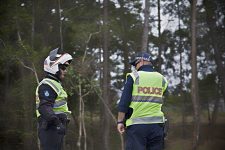Volunteer Police May Get Extra Powers

How would you feel if you were stopped on the street and subjected to a search – by someone other than a sworn officer of the police force?
Imagine if that person was simply a police volunteer, with even less training and experience than a police officer!
But new proposals in the United Kingdom could see this becoming an even more common occurrence – although levels of policing by volunteers is already incredibly high across the UK.
Home Secretary Theresa May wants to restructure policing – cutting the number of paid police officers and endowing volunteers with even more significant powers and duties.
This bombshell came earlier this month after Ms May warned that police force budgets would be cut, and so too would the number of paid police officers.
In the UK, volunteer ‘police community support officers’ can already detain and escort a person suspected of a crime to the police station, and hold them for 30 minutes until a sworn police officer arrives. They also have the power to require people to disclose their names and addresses.
And ‘special constables’ are a force made of trained volunteers who work with local police. The UK police volunteering website states that special constables have the same powers as regular police officers, wear a similar uniform and can even drive police vehicles. However, they are not permitted to carry or use tasers or firearms.
Special constables are not paid anything but can claim “reasonable expenses” that they incur in the performance of their duties. They are also meant to be subject to regular police disciplinary measures.
Despite the significant amount of work already being undertaken by unpaid volunteers, it is feared that when ministers re-evaluate the police budget, volunteers could be given even more power.
It has even been proposed that thousands more unsworn volunteers may be given the power to hand out fines; making them a judge, jury and executioner with very little training.
Ms May has stated that:
“There is more that volunteers can do. This government wants to encourage those with skills in particular demand, such as those with specialist IT or accountancy skills, to get involved and help the police to investigate cyber of financial crime, and, as their experience grows, to enable them to play a greater part in investigations.”
She also wants to utilise skills that are in high demand within the force – potentially recruiting IT experts and accountants to investigate cyber and financial crime.
Volunteering in the NSW police force
Members of the public who volunteer within the NSW police force are known as ‘Volunteers in Policing’ (VIPs).
Volunteers have been used in NSW since 1995, although they generally cannot volunteer more than 16 hours of their time per week. Their duties often include assisting with customer service and administrative work, and supporting witnesses during court proceedings. They also assist with youth programs, at school fetes and during disasters or other emergencies.
‘VIP’s’ do not perform actual police duties such as issuing fines or driving marked police cars, and they do not wear police uniforms. The use of guns and tasers by NSW police is also restricted to paid, sworn members of the force.
Implications of volunteer policing
Many members of the British public are outraged that core policing duties are being passed on to volunteers, describing the cost-cutting measure as “putting a little plaster on a patient who is bleeding to death.”
There are also concerns that the minimal training received by volunteer police is insufficient to equip them with the ability to make judgement calls and follow proper arrest procedures, potentially leading to illegal arrests and other forms of misconduct.
Over 17,000 UK police jobs have been cut since 2010, and it is now estimated that another 22,000 will go before the end of the decade. These gaps are likely to be filled by either private companies or volunteers, and there are concerns that either option will lead to unjust outcomes.






